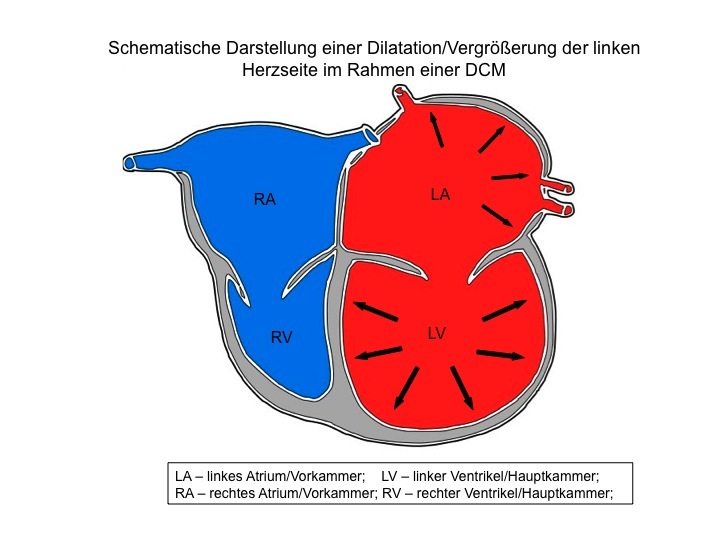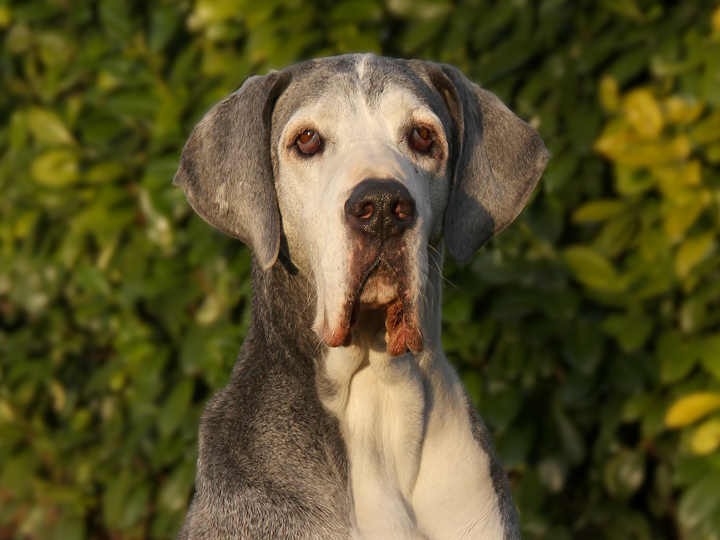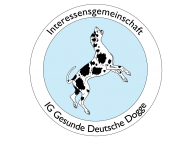In collaboration with the veterinary university of Hanover/Germany we have developed a research project to find a gene test for the two most frequent hereditary diseases of the great dane, the heart disease DCM and bonce cancer (Osteosarcoma, OS). Those diseases occur very often after the dogs have been bred and also healthy dogs can pass on the defect genes to their offspring. This is why a gene test is inevitable to fight those deadly diseases succesfully.
As both DCM and OS are inherited polygenetically – which means by many genes – there will never be a “yes/no” or “healthy/sick” gene test. Only gradiations can be detected to be able to combine dogs with a low risk of affected offspring. This means that most of the carrier dogs can still be used for beeding if they are mated to a suitable partner. The goal is to reduce the number of defect genes bit by bit in the whole population. This is important to preserve the genetic variety!
More information about DCM and bone cancer can be found here: frequent diseases in great danes.
Do you have an affected dog or a healthy great dane older than 8 years? Then you can participate!


Here you can donate money for our health fonds with which we finance the project:
The donations will go directly to the TIHO Hanover, we are going to put the bills online later on.
The research project will be executed in two steps:
Step 1: complete sequencing
Therefore we need the blood samples (plus diagnosis and pedigree) of 15 great danes with DCM, 15 gd with bone cancer and as a control group 15 healthy danes older than 8 years. Of each of those three groups two individuals will be chosen who are most representative and their whole genome will be sequenced.
This complete sequencing is quite expensive but therefore delivers reliable results in a short period of time.
Step 1 will cost about 8.000 Euros.
Step 2: B-Chip-Sequencing
In this phase the genome of the remaining 13 dogs of each group will be sequenced in parts (B-Chip). The results will be compared with the completely sequenced dogs and conclusions will be available in a short time.
This phase costs about 4.000 Euros.
This means that altogether we need about 12.000 Euros.
The participation in the study is free of charge. Only the heart ultrasound and the biopsy have to be paid by the dog owners themselves.
When the blood samples of the 3×15 danes have arrived in Hanover and the funding of 12.000 Euros it will take about half a year until first results will be available.
Blood samples from whole of Europe can be send. If samples from Switzerland are send it is important that there is written for the customs: value: 1CHF on the envelope. Otherwise there might be problems and costs arise. Unfortunately blood samples from outside of Europe or Switzerland cannot be accepted as it is too complicated paperwork and it is expensive due to veterinary laws.
The veterinary university of Hanover already has numerous blood samples of great danes collected due to the ichtyhosis gene test which had been created there as well. So if someone has sent the blood of his great dane in the last years to test it for ichthyosis those samples can also be used for the current study if the dog has DCM/OS now or is over 8 years old and still healthy. Only the clinical reports and the pedigree have to be send.
Important for danes with OS: the diagnosis has to be absolutely certain, thus a biopsy has to be performed and the report of the laboratory be send. On the report the chip number of the dog has to be noted!
Important for dogs with DCM: the diagnosis has to be made by a specialized cardiologist and has to be certain, so only dogs with DCM 2 (subclinical/occult) and DCM 3 (clinical) and not with DCM 1 (equivocal) can be accepted. On the report the chip number of the dog has to be noted!
Important for healthy danes over 8 years: an ultrasound report with the diagnosis DCM free made by a specialized cardiologist after the 8th birthday has to be send in. On the report the chip number of the dog has to be noted!
Only great danes can participate which are purebred. So the pedigree fo the dog has to be send in, on which the chip number is noted.
It is also important to report other diseases of the dog and if close relatives are affected with DCM or OS.
Here you can find the form needed to send in the blood sample to the veterinary university of Hanover:
All blood samples go directly to Hanover. The team of the healthy great dane association will not receive any information about the dogs that take part in the study. But of course we help if you have any questions about participation or donating money: info@healthy-dane.org
Here is the official site of the veterinary university of Hanover.

